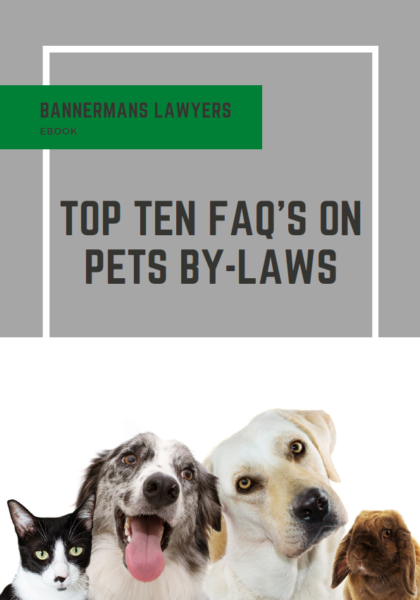New Pet Reform Laws Commenced on 24 August 2021: Why you may need a new By-Law
Posted 20 August 2021
Category: Strata, By-Laws
Amendments to the Strata Management Schemes Act 2015 (NSW) (SSMA) and its regulations came into effect on 24 August 2021. These changes significantly move the legal position on pets from the recent Court of Appeal decision in Cooper.
The newly included Section 137B in the SSMA provides that a by-law that unreasonably prohibits the keeping of an animal on a lot has no force or effect, which effectively means that it cannot be enforced. The new section does not stop owners corporations from making a pets by-law that places conditions on the keeping of animals as long as the conditions reasonably prohibit the keeping of an animal.
If an owners corporation which has an invalid pets by-law wishes to regulate the keeping of animals moving forward, the invalid pets by-law should be repealed and replaced by an updated pets by-law that reasonably prohibits the keeping of animals.
When will a pets by-law reasonably prohibit the keeping of animals?
Along with the addition of Section 137B into the SSMA, clause 36A has been added into the Strata Scheme Management Regulation 2016 (NSW) and also came into effect on 24 August 2021. It lists the circumstances in which the keeping of an animal unreasonably interferes with an occupant’s use and enjoyment of their lot and the common property. Such circumstances are:
- the animal makes a noise that persistently occurs to the degree that the noise unreasonably interferes with the peace, comfort or convenience of another occupant.
- the animal repeatedly runs at or chases another occupant, a visitor of another occupant or an animal kept by another occupant.
- the animal attacks or otherwise menaces another occupant, a visitor of another occupant or an animal kept by another occupant.
- the animal repeatedly causes damage to the common property or another lot.
- the animal endangers the health of another occupant through infection or infestation.
- the animal causes a persistent offensive odour that penetrates another lot or the common property.
- for a cat kept on a lot—the owner of the animal fails to comply with an order that is in force under the , section 31.
-
-
- the owner of the animal fails to comply with an order that is in force under the , section 32A, or
-
-
- the animal is declared to be a menacing dog or a dangerous dog under the , section 34, or
-
-
- the animal is a restricted dog within the meaning of the , section 55(1).
Tailored By-Laws
For Owners
Pet Applications
Owners corporations that make a valid pets by-law which requires occupants to make an application to keep an animal before the pet is allowed on the strata scheme must take note that Section 137B(5) of the SSMA states that an owners corporation is taken to have given permission for keeping of an animal on a lot if:
- it made a decision about the keeping of the animal that unreasonably prohibits the keeping of an animal, or
- a decision of the owners corporation is required before the animal may be kept on the lot and the owners corporation failed to make a decision within a reasonable time.
Accordingly, decisions made by an owners corporation in relation to a pet application must be based on a reason which reasonably prohibits the keeping of an animal and therefore must not be based on a reason that goes beyond protecting the occupants’ use and enjoyment of their lots from unreasonable interference caused by the keeping of an animal.
If you believe your strata scheme has an invalid pets by-law, we can assist you with the process of reviewing your current pets by-law and, if required, advising you on how to make a valid pets by-law that complies with the new legislation.
Related eBooks

***The information contained in this article is general information only and not legal advice. The currency, accuracy and completeness of this article (and its contents) should be checked by obtaining independent legal advice before you take any action or otherwise rely upon its contents in any way.

